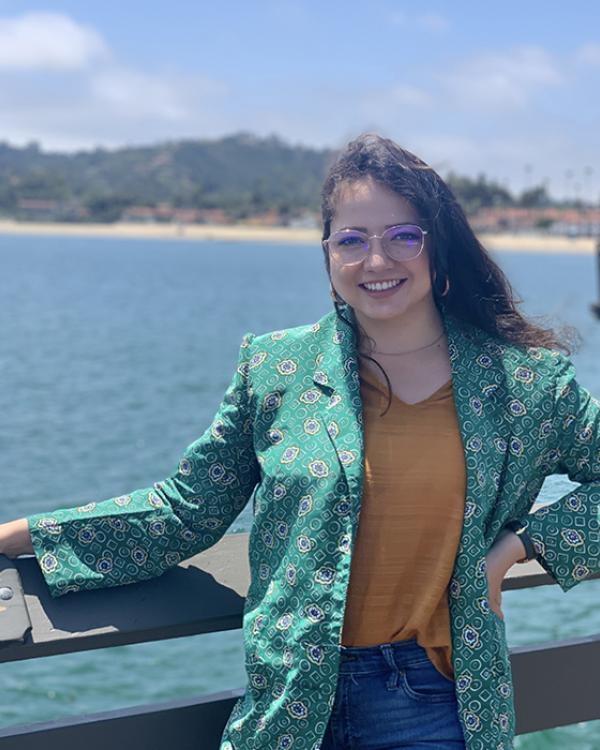
Natalie Larez, a second year student in the Department of Counseling, Clinical and School Psychology (CCSP), is one of just 60 graduate students nationally named to the prestigious Health Policy Research Scholars 2020 cohort. Health Policy Research Scholars—a program of the Robert Wood Johnson Foundation—is led by Johns Hopkins Bloomberg School of Public Health. Larez will receive a grant for $124,000 over four years as she works on her Ph.D.
The Health Policy Research Scholars program is designed for students from underrepresented populations and/or marginalized backgrounds—students whose race, ethnicity, socioeconomic status, ability, or other factors allow them to bring unique and diverse perspectives to their research.
Growing up in the border town of Douglas, Arizona, Larez fits this description exactly. Here is what she says about her experiences growing up in not just two worlds with bicultural ties—Mexico and the U.S.—but also in two versions of the U.S. once her family moved to the more prosperous Tucson.
“Douglas feels like home and really is always at the forefront of my thoughts when I am thinking about research and policy implications,” she begins. “By rich bicultural ties, I mean that sometimes it feels like I live in one world because the culture and community is similar in a lot of ways: most people speak Spanish, most people have family on both sides of the border wall, and a lot of people travel between the two countries on a daily basis, which is a huge privilege that not everyone has. Both communities have limited access to health care, very limited access to mental health, and limited access to educational opportunities but are even more exacerbated on the Mexico side.
“Essentially, my life has largely been influenced by the fact that I was transient between Mexico and the U.S. I was constantly aware of the lack of resources both communities had, but also constantly aware of the privileges of being a U.S. citizen and seemingly having access to the ‘American Dream.’ Even then, when I moved to Tucson, a city with much more resources, it was very evident that Douglas was still extremely under-resourced even if it was in the U.S. It was confusing to me because the U.S. side has the financial resources to support communities like Douglas, and yet we have not fulfilled the needs of these rural communities.”
Fortunately, as a new Health Policy Research Scholar, Larez will gain access to the tools, insights, and diversity of mentors needed to accelerate and distinguish her research. Alumni from the program carry the unique distinction of being a graduate of a Robert Wood Johnson Foundation leadership program and become a part of a tightly knit network of visionary change agents across sectors and disciplines.
“I cannot even begin to describe what I felt when I received the news that I was awarded this grant,” she asserts. “I cried, I was overwhelmed with happiness and also disbelief—immediately I thought about what this meant for me, for those I serve, for my family, etc. It means that I will have the tools, rarely taught in Ph.D. programs, to really make large-scale impact in the form of policy change. Additionally, the fact that I can learn alongside other scholars from various disciplines is something I really am excited for, because it has the potential to challenge my own perspective as a psychologist and gain insight from people from urban planning, engineering, public administration, which is so different from my own discipline. I think this multidisciplinary approach is extremely beneficial for the ways in which we try to address inequities.”
Larez is interested in examining how publicly funded institutions support the educational, physical, and mental health care needs of youth who have experienced significant childhood trauma. Specifically, she will examine better avenues in creating access for mental health services for minoritized, Spanish-speaking, under-resourced, and/or low-income communities.
And she realizes that work begins right in her CCSP cohort. “The other graduate students are phenomenal and I mean that so wholeheartedly,” she says. “Because of this program, I have friends who want to tackle the similar inequities from their own perspective and experiences. Additionally, CCSP gives me the foundational skills to be able to address systemic issues from the perspective of a school psychologist with skills in consultation and collaboration with folks outside my own profession. As a school psychologist, I have to consult with teachers, families, social workers, etc. This translates to work with policy because you also have to work with folks that are not in your discipline.”
Larez is clearly excited at the opportunity to become a change agent for communities like the one she grew up in and knows so well. She summarizes, “Together, the HPRS program and CCSP will allow me to gain tools that ultimately support my goal of working with minoritized communities to increase access to mental health services.”